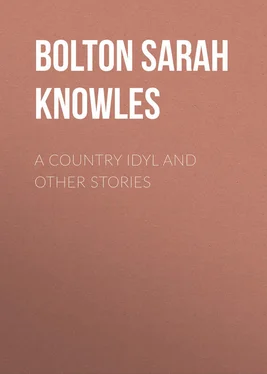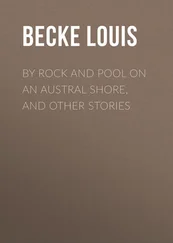Sarah Bolton - A Country Idyl and Other Stories
Здесь есть возможность читать онлайн «Sarah Bolton - A Country Idyl and Other Stories» — ознакомительный отрывок электронной книги совершенно бесплатно, а после прочтения отрывка купить полную версию. В некоторых случаях можно слушать аудио, скачать через торрент в формате fb2 и присутствует краткое содержание. Жанр: foreign_prose, foreign_antique, foreign_language, на английском языке. Описание произведения, (предисловие) а так же отзывы посетителей доступны на портале библиотеки ЛибКат.
- Название:A Country Idyl and Other Stories
- Автор:
- Жанр:
- Год:неизвестен
- ISBN:нет данных
- Рейтинг книги:4 / 5. Голосов: 1
-
Избранное:Добавить в избранное
- Отзывы:
-
Ваша оценка:
- 80
- 1
- 2
- 3
- 4
- 5
A Country Idyl and Other Stories: краткое содержание, описание и аннотация
Предлагаем к чтению аннотацию, описание, краткое содержание или предисловие (зависит от того, что написал сам автор книги «A Country Idyl and Other Stories»). Если вы не нашли необходимую информацию о книге — напишите в комментариях, мы постараемся отыскать её.
A Country Idyl and Other Stories — читать онлайн ознакомительный отрывок
Ниже представлен текст книги, разбитый по страницам. Система сохранения места последней прочитанной страницы, позволяет с удобством читать онлайн бесплатно книгу «A Country Idyl and Other Stories», без необходимости каждый раз заново искать на чём Вы остановились. Поставьте закладку, и сможете в любой момент перейти на страницу, на которой закончили чтение.
Интервал:
Закладка:
As soon as she reached her home she ran upstairs, hastily threw off her wraps, and remembered the letter from Arthur, in her pocket. Opening it, she read:
“How many times I have wanted to tell you that I loved you! How often have the words died on my lips! But now, before I go back to college, I must ask you if you can return that love, and sometime be mine.”
Alas, that she had not opened the letter sooner! She could not tell Arthur that she had preferred him to Elmer; that were disloyalty to the man whom she had promised to wed. She could only say that she was already betrothed to his brother. She married him whom she had promised. Both men became prominent in the history of New England – this little story is true. One went through life unmarried. His letter was opened too late.
THREE COLLEGE STUDENTS
“WHAT’S the work for vacation, boys?”
The speaker was a tall, dark-haired, open-faced young man, who sat with his two companions on the sloping ground of Amherst College, looking away to silent Mount Tom and the fertile meadows of the Connecticut-river valley.
“It’s something downright earnest for me,” said James Wellman, a broad-shouldered, big-hearted youth from the neighboring county, who in spite of poverty and many obstacles had fought his way by the hardest work. “I’m in debt for board, books unpaid for; but I’ve seen worse times than these. I’m used to standing alone, so I’m ready for the battle. I shall take an agency – books, or maybe clothes-wringers, to sell.”
“That will be fun, I’ll warrant,” said the first speaker, Grant Reynolds, whose father, a rich manufacturer, had spared no pains to make his son’s life a bed of roses, altogether different from what his own had been.
“Not much fun,” said James. “You wouldn’t like contemptuous looks from women who know less than you, and whose hearts had become hardened because their husbands, once poor, very likely, had become the possessors of houses on aristocratic streets. Why, a woman – I will not call her a lady – whose husband used to be a stable boy, but who has become a rich government official, ordered me out of the house when I was selling chromos. She said ‘agents were tramps and a nuisance;’ and when I explained that I was working my way through college, she answered, remembering the former occupation of her lord, perhaps, ‘Be somebody’s coachman, then, and earn an honorable living.’ I wanted to add, ‘And run away with your pretty daughter;’ but I only replied politely, ‘Nobody would hire an inexperienced man for two months, which is as long as our vacation lasts.’”
“But these must be rare cases,” said Grant. “Most well-to-do ladies are very courteous.”
“Yes, when you meet them on an equality in drawing-rooms; but not always when you are a workingman.”
“Well, I’ll try it for once. It’ll be a fine lark anyway, and I shall learn something of human nature.”
“That you will,” answered Wellman. “I’ll take the country round that aristocratic town down the river, and you may take the stylish avenues. You’ll find blue blood in plenty – blue because the fathers owned land there a little before the present generation. Of course, you’ll find many well-bred people who are proud of their heads rather than of their purses; but even these are often very ‘select.’ We profess equality, and are probably more democratic than any other country; but a little extra amount of front lawn, or the fact that our great-grandfather was a governor, or that one woman has ‘William Morris’ chintz in her chambers, of which, perhaps, her neighbor never heard, – these make various degrees of rank. If our ancestor came over in the ‘Mayflower,’ or was even a sutler in the Revolutionary war, our fame is unalterably fixed.”
“I should like to sell books in so high-toned a town,” said Grant. “Maybe I might fall in love with some dainty daughter of a lineal descendant of a governor, or of a stable-boy!”
“Precious little good it would do a book-agent, for you would be classed among poor people if you worked, no matter how rich your father might be.”
The conversation had been listened to by a light-haired, blue-eyed student, a poet in temperament and by heredity. He was the only child of a devoted minister of the Gospel, now dead, and of a refined and intellectual mother. She would have shielded him from every rough wind had it been possible, but at best she could only pray for him, and send him now and then a little box of comforts, with her fond and beautiful letters. He worked late at night over his books, and his delicately curved mouth had come to bear an expression of sadness as he looked out upon the struggle before him. Heretofore the little money of the household had sufficed; but now he must earn his bread like James Wellman.
“Cheer up!” said the latter, who had noticed the tell-tale face of the minister’s son, Kent Raymond. “Blue eyes and polished manners will win kindness. We all have to get a trifle mellowed. We, who know how to earn our support, get a little extra schooling more than the other boys, that’s all. Life is good or bad, just as you look out upon it. It’s full of sunshine to me, for I won’t look at the shadows.”
Vacation days came. Kent and Grant took the book-agency, and James the clothes-wringer, among the country folk, who usually have a kindly interest in a boy who means to be somebody in the world.
One bright day soon after, satchels in hand, the two college boys started out along one of the broad avenues of the staid old city.
“Don’t get discouraged!” said Grant to his boyish companion, who shrank from his task. “Remember you’re doing missionary work every time you get a book into a house. We’ll report three hours from now at the end of the street.”
The first house was of gray stone, set back in the grounds; not belonging to one of the old families, who prefer an old mansion, lest they be counted among the nouveaux riche . Great bunches of varied-colored coleus and red geranium mingled with the greensward like a piece of mosaic. Vines were beginning to grow over the stone porch, and the whole bespoke comfort, even luxury. Kent pulled the bell with a sinking at heart, as he wondered who would appear and what she would say. A servant, not cleanly in apparel, opened the door after long waiting. The true position of a family can generally be seen through its domestics.
“Are the ladies of the house in?” asked the college boy.
“What do you want of ’em?”
“I am selling a valuable book about the ‘Home.’”
“No, the missus don’t want it. She told me as how she niver let a book-agent inside the door, and she’d scold me if I called her. She niver reads nothin’ but a novel – niver,” volunteered the loquacious, but kind-hearted girl, despite her torn apron and soiled hands.
At the next mansion Kent was told that the “missus” had gone to the seashore; but the knowing look in the servant’s face showed that she had been instructed to make this reply to all callers. It sounded aristocratic to be at Narragansett Pier or on the Atlantic coast, even though finances would not permit of this refreshing journey.
At the next house a kind-faced woman, who really belonged to one of the old families, and felt none too proud to open her own door, bade the young man a pleasant “Good-morning,” and though she did not wish to purchase the book, which, though tastefully made, was commonplace in subject, she thanked him for seeing it, and hoped he would sell elsewhere. His heart was a trifle lighter after this kindly greeting, though his purse grew no heavier. At the next house, and the next, he met with the same refusals. Finally, near the end of the street, the colored man who opened the door was also striving to earn money for a college course. He had been two years in Harvard University already. Both father and mother were dead, but from love for a girl who taught a colored school he had become ambitious, and determined to work his way through some institution. The subject of the book touched his heart. Katie, his school-teacher, would like it; the suggestions about husbands and wives, and the words about neatness, culture, and tenderness, would do both good.
Читать дальшеИнтервал:
Закладка:
Похожие книги на «A Country Idyl and Other Stories»
Представляем Вашему вниманию похожие книги на «A Country Idyl and Other Stories» списком для выбора. Мы отобрали схожую по названию и смыслу литературу в надежде предоставить читателям больше вариантов отыскать новые, интересные, ещё непрочитанные произведения.
Обсуждение, отзывы о книге «A Country Idyl and Other Stories» и просто собственные мнения читателей. Оставьте ваши комментарии, напишите, что Вы думаете о произведении, его смысле или главных героях. Укажите что конкретно понравилось, а что нет, и почему Вы так считаете.











